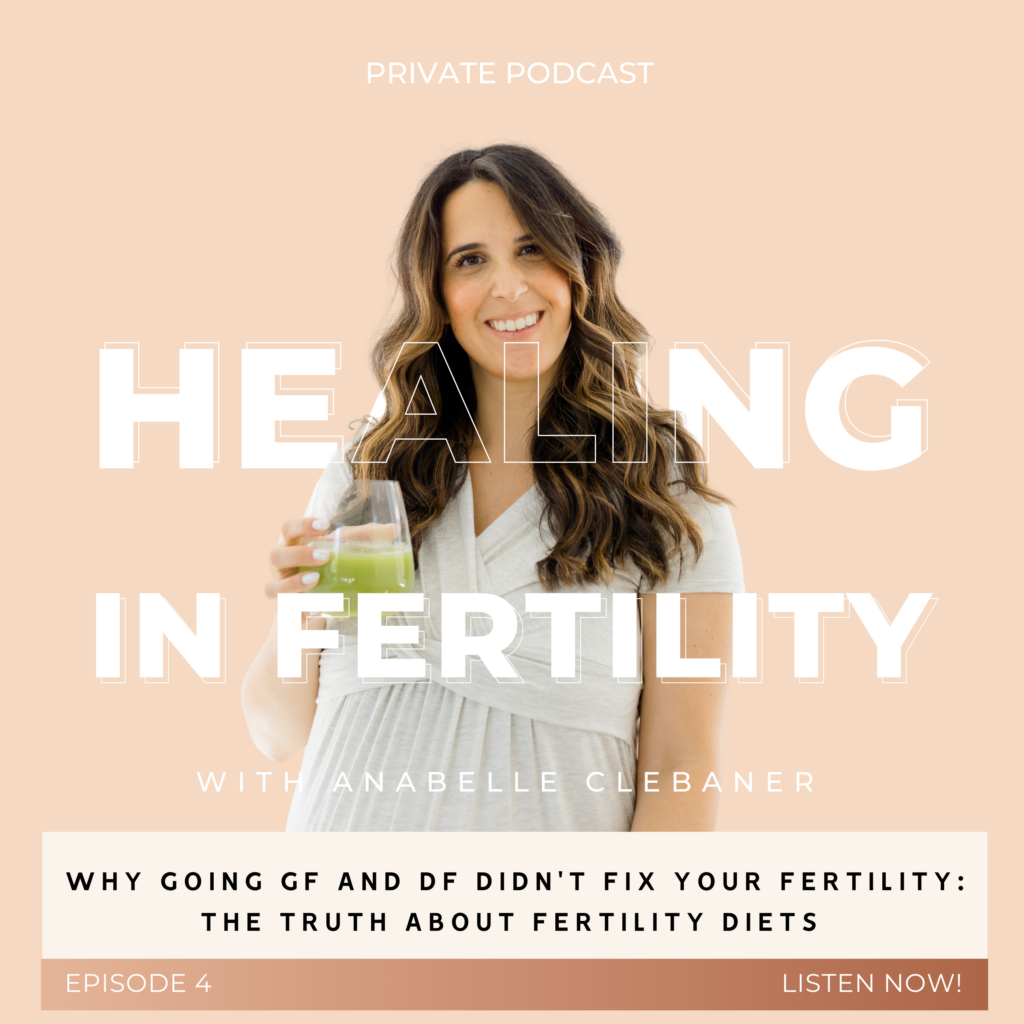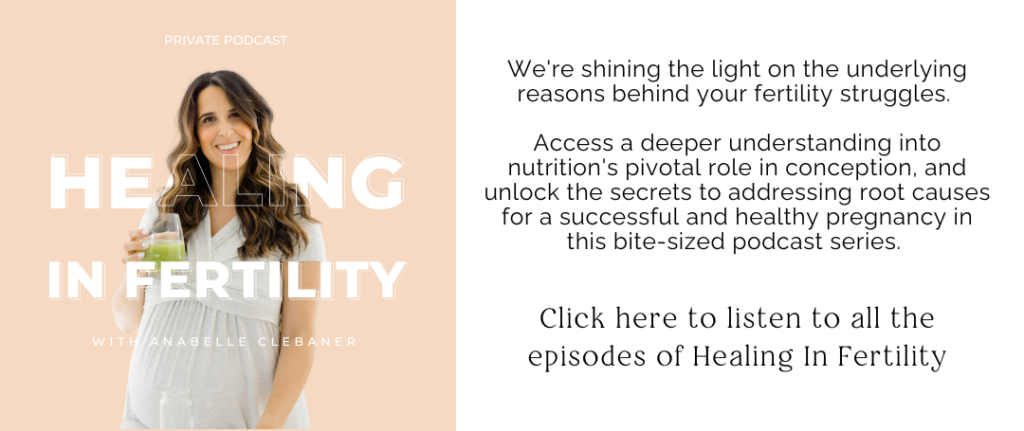Registered dietitian, functional nutritionist, & your new fertility BFF. I'm passionate about helping women thrive during preconception, pregnancy, and postpartum.
Nutrition
PCOS
Fertility
View All
Explore the blog
Hi, I'm Anabelle
Non-toxic Living
Work with our team
Episode 4: Why Going GF and DF Didn’t Fix Your Fertility: The Truth About Fertility Diets

If you want to listen to the full episode head over to: www.wellspringnutrition.co/healing-in-fertility
Transcript:
Welcome back to the Healing infertility Podcast. I’m your host, Anabelle Clebenar, registered dietitian, functional nutritionist and your new fertility bestie. In this episode, I’m going to talk about the importance of nutrition in your fertility journey me why cutting out your favorite foods isn’t going to be the magic bullet and the real deal on weight loss and fertility. Let’s dive in. So, you may have heard that nutrition is especially important in the preconception period, and if you haven’t heard that before, I’m going to tell you right now it is. So your nutrition directly impacts egg quality, ovulation hormone health, and even the health of your baby. In fact, a 2012 study showed that a methyl deficient diet so a diet that was deficient of methylation nutrients such as B, twelve B, six B, two folate, methionine choline, and betane. So having this methyl deficient diet around the time of conception resulted in significant changes in methionine cycles within ovarian follicles, which were tied to offspring being higher weight, more insulin resistant, having altered immune responses, and elevated blood pressure.
So this study was specifically looking at how these nutrients, namely like the B vitamins and folate choline, how these specifically not only impacted fertility, but how they impacted the health of the offspring in 2020. A more recent study from researchers at the Harvard School of Public Health and Harvard Medical School published a review of past studies that looked at the impact of diet on fertility. So they found that for women trying to become pregnant naturally without IVF or any assistive reproductive technologies, that there were certain vitamins and nutrients that were linked to positive effects on fertility, namely folic acid, vitamin B, twelve omega three fatty acids, and eating an overall healthy diet such as the Mediterranean diet. In this review study. They also looked at antioxidants vitamin D, dairy products, soy, caffeine and alcohol, which appeared to have little or no effect on fertility in this review, which is pretty interesting because we hear a lot about how caffeine can impact fertility and vitamin D. So I think there’s definitely more room for research around this, but an interesting find nonetheless. They also found that trans fats and unhealthy diets, which they classified as rich in red and processed meats, potatoes, sweets, and sweetened beverages, they found that these unhealthy diets were found to have negative effects on fertility. A few other studies from Harvard School of Public Health found that consumption of sugar sweetened beverages, especially sodas or energy drinks, was linked to lower fertility in both men and women, while drinking diet soda and fruit juice had no effect.
Another study looked at women who consumed high amounts of fast food and little fruit and found that it took them longer to become pregnant than those with healthier diets. And lastly, another study looked at couples that ate more seafood were pregnant sooner than those rarely eating seafood. So most pregnant women consume far less than the recommended two to three servings of low mercury fish like salmon, scallops and shrimp per week. And we know that one of the nutrients needed for fertility is zinc, which is found in high amounts in seafood, specifically oysters. So, as you can see, diet does in fact, play a huge role in fertility. There are countless studies examining different nutrients and overall dietary patterns, and we know that diet is the best way to influence changes on both egg and sperm quality. So what this means for you is you actually have a lot more control over your fertility than you may have thought or maybe were told or convinced. I want you to think about this because the way that you eat directly impacts your fertility.
And again, anything from ovarian health, hormone health, the health of your baby, all of this is impacted by nutrition. And when we’re thinking about a fertility diet, I want you to think less about specific nutrients or specific foods, and instead, try to focus on an overall balanced diet, one that includes healthy fats, complex carbs, protein, antioxidant rich foods. Iron rich foods. Foods with B vitamins like we talked about earlier. Omega three fatty acids that are found in fatty fish, flaxseeds or other nuts and seeds, dairy or calcium alternatives and limiting overall processed foods. Added sugars, caffeine and alcohol. So let’s dive into our next topic, which is why eliminating certain foods like gluten or dairy isn’t going to be the magic bullet for your fertility. So let’s get this disclaimer out of the way.
The Truth About Dairy, Gluten, and Fertility
If you have celiac disease, if you have gluten sensitivities, if you’re lactose intolerant, obviously it makes sense to avoid these foods. I’ve also seen women struggling with acne eliminating dairy, and that being very effective. But putting all of that aside, I tend to see many women going gluten free and dairy free and starting to cut more and more foods from their diet because they’re told that it will benefit their fertility. So the most recent research around dairy seems to be that there’s actually no impact on fertility, meaning you could include it or not, but it wouldn’t severely impact your fertility by cutting it out. And when we cut out dairy, we’re actually cutting out many beneficial vitamins and nutrients, such as vitamin A, calcium, vitamin D, et cetera. Now, for some people, cutting out gluten can be really helpful in a sense that their overall dietary pattern wasn’t that great to begin with. And cutting out gluten was the thing that helped them kind of focus more on eating more vegetables, fruits, healthy fats, grains, things of that nature. But it’s really not necessary to cut it out completely in order for you to conceive.
I want you, again, to focus on overall dietary pattern rather than fixating and restricting, because these foods aren’t going to be the magic bullet for you to get pregnant. If that were the case, every single person that went gluten free and dairy free would not have any fertility struggles. And as we know, that’s simply not the case. So in this last section, I want to briefly talk about weight and fertility. We tend to focus on being overweight, but I want to also mention the impacts of being underweight for fertility. So being underweight can impact your cycle health. It can impact overall hormones. I tend to see low progesterone, especially with women who are undereating.
And this can be a major factor because not only are you not giving your body the proper nutrients to nourish a healthy pregnancy, but you’re also causing more stress on your body. So as mentioned in previous episodes, stress has a huge part in fertility and over training, and undereating can cause a lot of stress on your body. In addition to that excess exercise, any other stress that you’re carrying, it all kind of adds up. I also want to touch on the other side of this conversation where women who are overweight or obese are automatically told that they need to lose weight. And often in a fertility clinic setting, they have to lose weight in order to qualify for fertility treatments. So whether it’s from a fertility clinic or just their regular doctor that they’re being told that they have to lose weight, this really doesn’t address any other factors when it comes to fertility. So in a 2022 study, there was a randomized controlled study of 379 women with obesity and unexplained infertility. They were randomly assigned to one of two preconception lifestyle modification groups that lasted 16 weeks.
The Impact of Weight Loss on Fertility
The first group underwent increased physical activity and weight loss through meal replacements and medication, and the second group had increased physical activity alone without weight loss. They followed them for three years, and then they measured the number of healthy live births, which they classified as full term infants of normal weight without any major anomalies. And what they found in this study, that the preconception intensive lifestyle intervention. So that first group that got meal replacements and medication for weight loss did not improve fertility or birth outcomes compared to the exercise intervention without targeted weight loss. So basically what it’s saying is that the focus on weight loss did not have an impact on overall fertility and live birth rate. And I know this is one study, and I know that research continues to develop on this, but I thought this was really important to share because it was a significant study following over almost 400 women over three years and really taking a look at how weight impacts fertility. And we’re so focused on the weight loss that we forget that there’s a bigger picture. The bigger picture is overall dietary pattern, inflammation, blood sugar balance, physical activity, nutrient status, and more.
So the focus should not just be on weight loss when we’re talking about nutrition for fertility, but rather focusing instead on a nutrient dense diet that balances blood sugar and that nourishes the woman who will be the mother. So I hope you found this episode helpful. In my next episode, I’m going to be talking with a previous client of mine, a woman who overcame her fertility struggles with PCOS, who was told that she absolutely needed IVF, and she went on to have a healthy baby naturally. So I’ll see you in the next episode. If you have questions, you want to reach out, feel free to send me a message on Instagram. My handle is at TTC dietitian. Bye.
Leave a Reply Cancel reply
The Preconception Playbook
This free playbook provides specific actionable tips to get started on your fertility journey, as well as what to avoid while you're trying to conceive.
Get the free playbook
Functional nutrition for women & couples trying to conceive
Get the Preconception Playbook
Actionable tips to get started on your fertility journey, as well as what to avoid while you're trying to conceive.


Be the first to comment